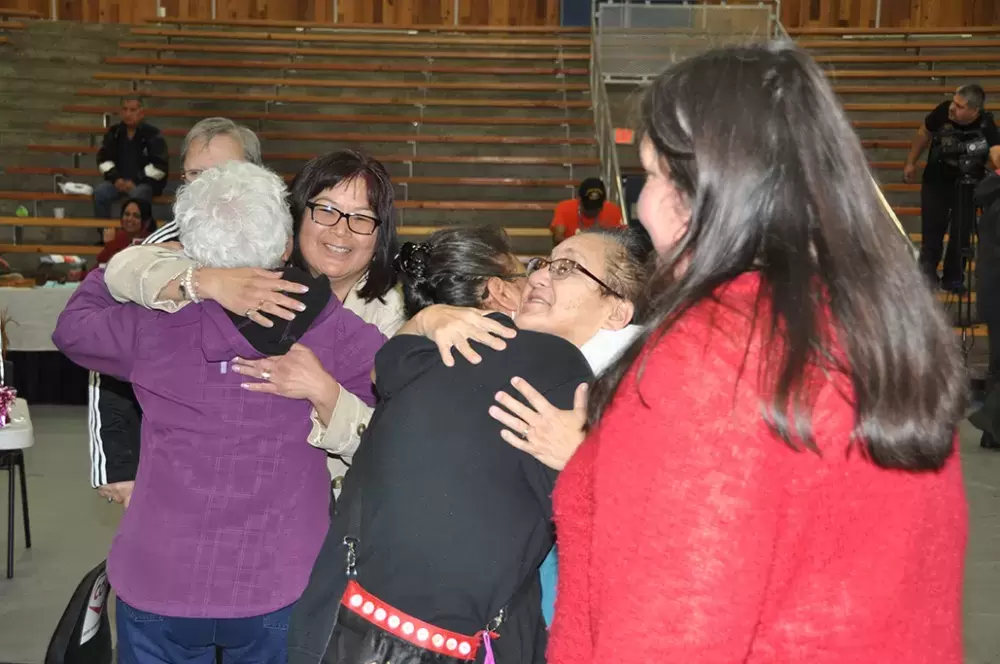Stan Matthew shared his lifelong journey of sobriety and spirituality with participants at the DAC Health Ability Fair on Thursday.
Matthew, the son of Andrew David and Lucy Matthew, has been clean and sober for 29 years, and part of that recovery process has been to share his journey with others.
“I was two months sober when I did my first public speech,” he said in his introduction.
But first, he called on guests to rise from their seats, and get 15 hugs or handshakes. That touched off a frenetic few minutes as his audience jumped into the spirit of things.
“It’s been a journey of wellness, a journey of hope, a journey of self-discovery and of finding out who Stan wanted to be and what Stan wanted to do,” Matthew said.
“I was the youngest of nine children. You know what it’s like to be picked on and spoiled at the same time,” he said, noting that there was both alcohol abuse and domestic violence in his home.
His father passed away when Matthew was seven, and he was unable to comprehend the idea of death. All he knew was that he was taken “to see his dad in a box. And then they put the box in the ground.”
He had his first blackout drunk at nine. Kicked out of school at 14, he had to go to work.
“I had all kinds of addictions… pills, drinking – all sorts of things that other people died of.
“I got caught up in the juvenile [court] system. I thought I was making a lot of money, but really, I was stealing a lot of money.”
When, at 16, his mother passed away, he drank for 30 days straight, and only survived when his friends intervened. At 18, he underwent counselling for the first time, but failed. He tried again at 21, but “went back out” after being separated from his son.
“At 25, I decided I did not want to inflict my own death on my son,” he said.
Matthews’ journey of recovery began at the Kelowna Friendship Society, where, among other things, he completed his high-school equivalency.
He also learned that the best way to get better was to help others.
“I had only been sober six months when they asked me to undertake a [volunteer] alcohol counsellor training program,” he said. “What a life-changing thing that was.”
He also discovered that by surrounding yourself with other people in recovery can provide some amazing opportunities. At a Twelve-Step meeting, he met a mentor who later proved to be a practicing psychologist who specialized in hypnotherapy.
“I tried a year of hypnotherapy and had some success at dealing with my self-destructive behavior,” he said.
In time, Matthew realized he had made that leap of faith each of us needs in order to get well.
“I realized we have a choice to make ourselves better and change the direction in our lives,” he said, “But it took me a long time to figure that out.”
In 2008, he certified as a clinical hypnotherapist, and currently serves as the NTC CHS (suicide prevention) training coordinator.
Matthew said he can now look back to a boy who suffered intense crying binges up to the age of 17, who felt lost and hopeless and felt he couldn’t go on.
“That little boy was me,” he said. “But because I started to look at myself and to heal from my past and to heal some of the things in my life, I now feel like I belong. I now feel like I am part of something. But most importantly, I feel like I can give back. I feel like I can give back to our people who want help and who want to change their lives.”
Matthews said he wanted to end by “acknowledging our women for what they do.
“We are in a time now that, there is so much happening in our communities – across Canada and down in the States – our women are a very vital and a very intricate part of who we are as a people. We need to start lifting our women up.
Most of all, Matthews said, Nuu-chah-nulth women know the importance of traditional culture in the life of a family.
“Without them, our children and youth wouldn’t be dancing.”







